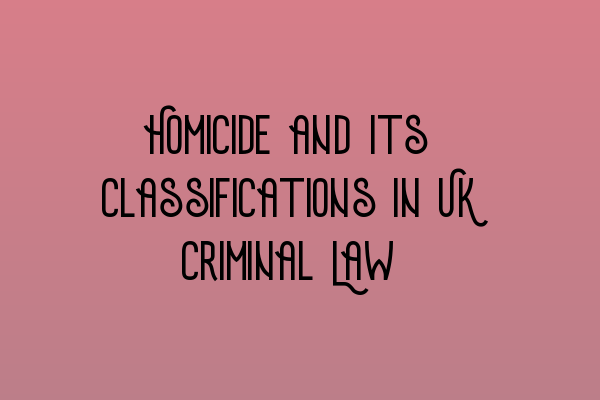Homicide and Its Classifications in UK Criminal Law
When it comes to criminal law in the UK, one of the most serious offenses a person can commit is homicide. This term encompasses the unlawful killing of a person and carries severe legal consequences. In this blog post, we will explore the various classifications of homicide in UK criminal law and shed light on the different legal principles that apply to each category.
Murder
Murder is the most serious form of homicide in UK criminal law. It occurs when a person intentionally kills another person with malice aforethought. Malice aforethought means the intent to cause death or grievous bodily harm. The burden of proof in murder cases is quite high, and the prosecution must demonstrate that the accused had both the intent to kill and the requisite level of planning or premeditation.
If proven guilty of murder, the accused faces life imprisonment, with a minimum term determined by the judge based on the circumstances of the case. It is important to note that a conviction for murder can only be secured by a unanimous decision of the jury, ensuring a fair and just trial.
For more information on murder and its legal provisions, refer to articles on SQE 1 Practice Exam Questions and SQE 1 Practice Mocks FLK1 FLK2.
Manslaughter
Manslaughter is another category of homicide, but it differs from murder in terms of intent. Manslaughter occurs when a person unlawfully kills another person but without the intent to cause death or serious harm. It can be further classified into two distinct categories: voluntary manslaughter and involuntary manslaughter.
Voluntary manslaughter arises when the accused, in the heat of the moment, kills another person while suffering from diminished responsibility or loss of control. These factors can mitigate the charge from murder to voluntary manslaughter.
Involuntary manslaughter, on the other hand, occurs when a person unknowingly causes the death of another through an unlawful or dangerous act. It is important to note that the accused did not have the intent to cause harm or death, but their actions led to the tragic consequence.
Manslaughter charges carry significant legal consequences but are generally less severe than murder. The maximum sentence for manslaughter is life imprisonment, but the court has discretion in determining the appropriate punishment based on the circumstances of the case.
To delve deeper into the nuances of manslaughter in UK criminal law, consider reading related material on SQE 2 Preparation Courses and SQE 1 Preparation Courses.
Infanticide
Infanticide is a distinct category of homicide that specifically applies to the killing of a child by its mother. This offense arises from a complex set of circumstances, including the stress and consequences associated with childbirth, postnatal depression, and disturbed mental balance caused by these factors.
Infanticide is seen as a distinct category because it acknowledges the unique circumstances that mothers may face after childbirth. It is considered a lesser offense than murder or manslaughter, and the legal provisions surrounding infanticide allow for more leniency in sentencing.
Conclusion
Homicide is a serious crime with severe legal consequences. Understanding the classifications of homicide in UK criminal law is crucial for both legal professionals and the general public. Murder, manslaughter, and infanticide each have their own distinct criteria and legal principles, determining the severity of the offense and the appropriate punishment.
If you wish to stay updated with the latest information on SQE exams and related legal topics, be sure to check out the SRA SQE Exam Dates at SQE Criminal Law & Practice Law UK.
